0920-24AL Baseline Questionnaire
[NIOSH] Occupational Exposures to Surgical Smoke in Veterinary Personnel
Att. 7–Baseline Questionnaire
OMB: 0920-1449

Form Approved
OMB No. XXX
Exp. Date XX/XX/XXXX
Baseline Questionnaire
Date: __ __ / __ __ / __ __ __ __ Unique ID: __________
(Month) (Day) (Year) (assigned by study personnel)
Section I: Screening
Have you worked at a clinical veterinary practice in any position
(including, but limited to, veterinarian; veterinary technologist,
nurse, technician, or assistant; kennel staff; grooming staff; office staff;
or environmental services staff) at any time during the past 12 months? 1.____ Yes 0. ____ No
IF YES: CONTINUE
IF NO: STOP
Date of Birth: __ __ / __ __ / __ __ __ __
(data collection system to calculate age) (Month) (Day) (Year)
IF >=18 years old: CONTINUE
IF <18 years old: STOP
Section II: Demographic Information
What is your race and/or ethnicity? One or more
categories may be selected. 1.___ American Indian or Alaska Native
For example, Navajo Nation, Blackfeet Tribe of the Blackfeet Indian Reservation of Montana, Native Village of Barrow Inupiat Traditional Government, Nome Eskimo Community, Aztec, Maya, etc.
2.___ Asian
For example, Chinese, Asian Indian, Filipino, Vietnamese, Korean, Japanese, etc.
3.___ Black or African American
For example, African American, Jamaican, Haitian, Nigerian, Ethiopian, Somali, etc.
4.___ Hispanic or Latino
For example, Mexican, Puerto Rican, Salvadoran, Cuban, Dominican, Guatemalan, etc.
5.___ Middle Eastern or North African
For example, Lebanese, Iranian, Egyptian, Syrian, Iraqi, Israeli, etc.
6.___ Native Hawaiian or Pacific Islander
For example, Native Hawaiian, Samoan, Chamorro, Tongan, Fijian, Marshallese, etc.
7.___ White
For example, English, German, Irish, Italian, Polish, Scottish, etc.
What is your current gender? One or more categories
may be selected. 1.___ Female
2.___ Male
3.___ Transgender
4.___ [If respondent marked AIAN] Two-Spirit
5.___ I use a different term
IF I USE A DIFFERENT TERM:
Describe: ___________________________________________________________
Public
reporting burden of this collection of information is estimated to
average 28 minutes per response, including the time for reviewing
instructions, searching existing data sources, gathering and
maintaining the data needed, and completing and reviewing the
collection of information. An agency may not conduct or sponsor, and
a person is not required to respond to a collection of information
unless it displays a currently valid OMB control number. Send
comments regarding this burden estimate or any other aspect of this
collection of information, including suggestions for reducing this
burden to - CDC/ATSDR Reports Clearance Officer; 1600 Clifton Road
NE, MS H21-8, Atlanta, Georgia 30333 ATTN: PRA (0920-XXXX).
What sex were you assigned at birth, on your original birth
certificate? 1.____ Male 0. ____Female
What is the highest grade or level of school you have
completed or the highest degree received? 1.____ 8th grade or less
2.____ 9th-12th grade (no diploma)
3.____ High school graduate (diploma)
4.____ GED or equivalent
5.____ Some college (no degree)
6.____ Associate’s degree: occupational, technical, or vocational program
7.____ Associate’s degree: academic (general education)
8.____ Bachelor’s degree (example: BA, AB, BS, BBA)
9.____ Master’s degree (example: MA, MS, MEng, Med, MBA)
10.___ Professional school degree (example: MD, DDS, DVM, JD)
11.___ Doctoral degree (example: PhD, EdD)
Section III: Current Health Information
The next set of questions are about your health. The answer to many of these questions will be “Yes” or “No.”
If you are in doubt about whether to answer “Yes” or “No,” then please answer “No.”
During the past 12 months, have you had any trouble
with your breathing? 1.____ Yes 0. ____ No
IF YES:
Which of the following statements best
describes your breathing? 1. ___ I only rarely have trouble with my breathing.
2. ___ I have regular trouble with my breathing, but it always gets completely better.
3. ___ My breathing is never quite right.
When you are away from clinical veterinary practice on days
off or on vacation, is the trouble with your breathing: 1.___ The same
2.___ Worse
3.___ Better
During the past 4 weeks, have you had any trouble
with your breathing? 1.____ Yes 0. ____ No
Are you troubled by shortness of breath when hurrying
on level ground or walking up a slight hill? 1.____ Yes 0. ____ No
IF YES:
Do you get short of breath walking with people of
your own age on level ground? 1.____ Yes 0. ____ No
Do you ever have to stop for breath when walking
at your own pace on level ground? 1.____ Yes 0. ____ No
Do you ever have to stop for breath after walking about
100 yards (or after a few minutes) on level ground? 1.____ Yes 0. ____ No
In what month and year did your breathlessness start? __ __ / __ __ __ __
(Month) (Year)
Do you usually have a cough? 1.____ Yes 0. ____ No
(Count cough with first smoke or on first going out-of-doors.
Exclude clearing of throat.)
IF YES:
Do you usually cough on most days for 3
consecutive months or more during the year? 1.____ Yes 0. ____ No
In what month and year did this cough begin? __ __ / __ __ __ __
(Month) (Year)
When you are away from clinical veterinary practice on days
off or on vacation, is your cough: 1.___ The same
2.___ Worse
3.___ Better
Is there anything at the clinical veterinary practice that causes or
aggravates this cough? 1.____ Yes 0. ____ No
IF YES:
Describe:________________________________________________________
Have you had a cough at any time in the last 4 weeks? 1.____ Yes 0. ____ No
Do you bring up phlegm on most days for 3
consecutive months or more during the year? 1.____ Yes 0. ____ No
Have you had wheezing or whistling in your chest at
any time in the last 12 months? 1.____ Yes 0. ____ No
IF YES:
When you are away from clinical veterinary practice on days
off or on vacation, is this wheezing or whistling: 1.___ The same
2.___ Worse
3.___ Better
Is there anything at the clinical veterinary practice that causes or
aggravates this wheezing or whistling? 1.____ Yes 0. ____ No
IF YES:
Describe:________________________________________________________
Have you had wheezing or whistling in your chest
at any time in the last 4 weeks? 1.____ Yes 0. ____ No
Have you woken up with a feeling of tightness in your
chest at any time in the last 12 months? 1.____ Yes 0. ____ No
IF YES:
When you are away from clinical veterinary practice on days
off or on vacation, is this chest tightness: 1.___ The same
2.___ Worse
3.___ Better
Is there anything at the clinical veterinary practice that causes or
aggravates this chest tightness? 1.____ Yes 0. ____ No
IF YES:
Describe:________________________________________________________
Have you woken up with a feeling of tightness in
your chest at any time in the last 4 weeks? 1.____ Yes 0. ____ No
Have you been woken by an attack of shortness of breath at
any time in the last 12 months? 1.____ Yes 0. ____ No
IF YES:
When you are away from clinical veterinary practice on days
off or on vacation, are these attacks of shortness of breath: 1.___ The same
2.___ Worse
3.___ Better
Is there anything at the clinical veterinary practice that causes or
aggravates these attacks of shortness of breath? 1.____ Yes 0. ____ No
IF YES:
Describe:________________________________________________________
Have you been woken by an attack of shortness of
breath at any time in the last 4 weeks? 1.____ Yes 0. ____ No
Have you had an attack of asthma in the last 12 months? 1.____ Yes 0. ____ No
IF YES:
When you are away from clinical veterinary practice on days
off or on vacation, are these attacks of asthma: 1.___ The same
2.___ Worse
3.___ Better
Is there anything at the clinical veterinary practice that causes or
aggravates these attacks of asthma? 1.____ Yes 0. ____ No
IF YES:
Describe:________________________________________________________
Have you had an attack of asthma in the last 4 weeks? 1.____ Yes 0. ____ No
Are you currently taking any medicine including inhalers,
aerosols, or tablets for asthma? 1.____ Yes 0. ____ No
IF YES:
When you are away from clinical veterinary practice on days
off or on vacation, do you take the medicine for asthma: 1.___ The same
2.___ More Often
3.___ Less Often
Are you currently taking any medicine including inhalers,
aerosols, or tablets for other breathing problems? 1.____ Yes 0. ____ No
IF YES:
When you are away from clinical veterinary practice on days
off or on vacation, do you take the medicine for other
breathing problems: 1.___ The same
2.___ More Often
3.___ Less Often
During the past 12 months, have you had episodes of a
stuffy, itchy, or runny nose? 1.____ Yes 0. ____ No
IF YES:
When you are away from clinical veterinary practice on days
off or on vacation, are these nose symptoms: 1.___ The same
2.___ Worse
3.___ Better
Is there anything at the clinical veterinary practice that causes or
aggravates these nose symptoms? 1.____ Yes 0. ____ No
IF YES:
Describe:________________________________________________________
Have you had episodes of a stuffy, itchy,
or runny nose in the past 4 weeks? 1.____ Yes 0. ____ No
During the past 12 months, have you had episodes of a
stinging or burning nose? 1.____ Yes 0. ____ No
IF YES:
When you are away from clinical veterinary practice on days
off or on vacation, are these nose symptoms: 1.___ The same
2.___ Worse
3.___ Better
Is there anything at the clinical veterinary practice that causes or
aggravates these nose symptoms? 1.____ Yes 0. ____ No
IF YES:
Describe:________________________________________________________
Have you had episodes of a stinging or burning
nose in the past 4 weeks? 1.____ Yes 0. ____ No
During the past 12 months, have you had a problem with sneezing,
or a runny, or blocked nose when you did not have a cold or the flu? 1.____ Yes 0. ____ No
IF YES:
When you are away from clinical veterinary practice on days
off or on vacation, are these nose symptoms: 1.___ The same
2.___ Worse
3.___ Better
Is there anything at the clinical veterinary practice that causes or
aggravates these nose symptoms? 1.____ Yes 0. ____ No
IF YES:
Describe:________________________________________________________
Have you had a problem with sneezing, or a runny, or
blocked nose when you did not have a cold or the flu in
the past 4 weeks? 1.____ Yes 0. ____ No
During the past 12 months, have you had sinusitis
or sinus problems? 1.____ Yes 0. ____ No
IF YES:
When you are away from clinical veterinary practice on days
off or on vacation, are these sinus problems: 1.___ The same
2.___ Worse
3.___ Better
Is there anything at the clinical veterinary practice that causes or
aggravates these sinus problems? 1.____ Yes 0. ____ No
IF YES:
Describe:________________________________________________________
Have you had sinusitis or sinus problems
in the past 4 weeks? 1.____ Yes 0. ____ No
During the past 12 months, have you had hoarseness or a dry, sore,
or burning throat? 1.____ Yes 0. ____ No
IF YES:
When you are away from clinical veterinary practice on days
off or on vacation, are these throat symptoms: 1.___ The same
2.___ Worse
3.___ Better
Is there anything at the clinical veterinary practice that causes or
aggravates these throat symptoms? 1.____ Yes 0. ____ No
IF YES:
Describe:________________________________________________________
Have you had hoarseness or a dry, sore, or burning throat
in the past 4 weeks? 1.____ Yes 0. ____ No
During the past 12 months, have you had episodes of
watery, itchy eyes? 1.____ Yes 0. ____ No
IF YES:
When you are away from clinical veterinary practice on days
off or on vacation, are these eye symptoms: 1.___ The same
2.___ Worse
3.___ Better
Is there anything at the clinical veterinary practice that causes or
aggravates these eye symptoms? 1.____ Yes 0. ____ No
IF YES:
Describe:________________________________________________________
Have you had episodes of watery, itchy
eyes in the past 4 weeks? 1.____ Yes 0. ____ No
During the past 12 months, have you had episodes of
stinging or burning eyes? 1.____ Yes 0. ____ No
IF YES:
When you are away from clinical veterinary practice on days
off or on vacation, are these eye symptoms: 1.___ The same
2.___ Worse
3.___ Better
Is there anything at the clinical veterinary practice that causes or
aggravates these eye symptoms? 1.____ Yes 0. ____ No
IF YES:
Describe:________________________________________________________
Have you had episodes of stinging or burning
eyes in the past 4 weeks? 1.____ Yes 0. ____ No
During the past 12 months, have you had frequent or severe
headaches, including migraines? 1.____ Yes 0. ____ No
IF YES:
When you are away from clinical veterinary practice on days
off or on vacation, are these headaches: 1.___ The same
2.___ Worse
3.___ Better
Is there anything at the clinical veterinary practice that causes or
aggravates these headaches? 1.____ Yes 0. ____ No
IF YES:
Describe:________________________________________________________
Have you had frequent or severe headaches, including
migraines, in the past 4 weeks? 1.____ Yes 0. ____ No
During the past 12 months, have you had episodes of fever,
chills, or flu-like achiness? 1.____ Yes 0. ____ No
IF YES:
When you are away from clinical veterinary practice on days
off or on vacation, are these episodes of fever, chills, or
flu-like achiness: 1.___ The same
2.___ Worse
3.___ Better
Is there anything at the clinical veterinary practice that causes or
aggravates these episodes of fever, chills, or
flu-like achiness? 1.____ Yes 0. ____ No
IF YES:
Describe:________________________________________________________
Have you had episodes of fever, chills, or flu-like
achiness in the past 4 weeks? 1.____ Yes 0. ____ No
Have you ever been told by a physician or other health professional that you had any of the following conditions? (Select all that apply.)
-
Conditions
Month and year of
first diagnosis?
Thought to be
work-related?
1. ____ Hay fever or nasal allergies
__ __ / __ __ __ __
1.____ Yes 0. ____ No
2. ____ Animal-related allergies
__ __ / __ __ __ __
1.____ Yes 0. ____ No
3. ____ Eczema, dermatitis, or skin allergy
__ __ / __ __ __ __
1.____ Yes 0. ____ No
4. ____ Heart disease
__ __ / __ __ __ __
1.____ Yes 0. ____ No
5. ____ Gastroesophageal reflux disease (GERD)
__ __ / __ __ __ __
1.____ Yes 0. ____ No
6. ____ Sinusitis or sinus infections
__ __ / __ __ __ __
1.____ Yes 0. ____ No
7. ____ Chronic bronchitis
__ __ / __ __ __ __
1.____ Yes 0. ____ No
8. ____ Emphysema
__ __ / __ __ __ __
1.____ Yes 0. ____ No
9. ____ Chronic obstructive pulmonary disease (COPD)
__ __ / __ __ __ __
1.____ Yes 0. ____ No
10. ____ Hypersensitivity pneumonitis
__ __ / __ __ __ __
1.____ Yes 0. ____ No
11. ____ Chemical pneumonitis
__ __ / __ __ __ __
1.____ Yes 0. ____ No
12. ____ Sarcoidosis
__ __ / __ __ __ __
1.____ Yes 0. ____ No
13. ____ Interstitial lung disease
__ __ / __ __ __ __
1.____ Yes 0. ____ No
14. ____ Asthma
__ __ / __ __ __ __
1.____ Yes 0. ____ No
IF YES:
14.1 Do you still have asthma?
1.____ Yes 0. ____ No
1.____ Yes 0. ____ No
15. ____ Cancer
1.____ Yes 0. ____ No
IF YES:
15.1 What type of cancer(s)? __________________________________________________
15.2 Month and year of first diagnosis(es)? _________________________________________
Have you ever been told by a physician or other health
professional that you had any other respiratory condition
(infectious or non-infectious)? 1.____ Yes 0. ____ No
IF YES:
(online questionnaire to allow multiple entries)
What was the diagnosis: _______________________________________________
Was this condition suspected to be work-related? 1.____ Yes 0. ____ No
In what month and year were you first given this
respiratory condition diagnosis? __ __ / __ __ __ __
(Month) (Year)
IF YES to QUESTION #14 (attack of asthma in the last 12 months) or QUESTION #26.14 (Asthma):
Since you began working in a veterinary clinic setting,
is your asthma: 1.___ The same
2.___ Worse
3.___ Better
Have you ever had to change your veterinary work duties
because of your asthma? 1.____ Yes 0. ____ No
IF YES:
Describe: ______________________________________________________________
IF YES to QUESTION #26.1 (Hay fever or nasal allergies) or QUESTION #26.2 (Animal-related allergies):
Since you began working in a veterinary clinic setting,
are your allergies: 1.___ The same
2.___ Worse
3.___ Better
Have you ever had to change your veterinary work duties
because of your allergies? 1.____ Yes 0. ____ No
IF YES:
Describe: ______________________________________________________________
Section IV. Tasks and Related Potential Hazards
The next set of questions are about tasks and related potential hazards at work.
During an average work week, are you exposed to surgical smoke
generated during electrosurgery (including electrocautery,
diathermy, and ultrasonic devices)? 1.____ Yes 0. ____ No
IF YES:
When was the last time you received training that addresses
the hazards of surgical smoke? 1.____ Within the past 12 months
2.____ More than 12 months ago
3.____ I never received training
Does your employer have standard procedures that
address potential hazards of surgical smoke? 1.___ Yes 0. ___ No 2. ___ Don’t Know
At any time in the past 7 calendar days, did you work within
5 feet of the source of surgical smoke during electrosurgery?
(Electrosurgery includes electrocautery, diathermy, and
ultrasonic devices.) 1.____ Yes 0. ____ No
IF YES:
Local Exhaust Ventilation (LEV) captures and removes contaminants at the point where they are being produced, such as a portable exhaust system with high efficiency particulate filters, or a flexible tube connected to a room (wall) suction system. LEV does not include blood suction canister systems.
Electrosurgery includes electrocautery, diathermy, and ultrasonic devices.
During the past 7 calendar days, how often was LEV
(e.g., portable smoke evacuator or room [wall] suction
system) used while you worked within 5 feet of the
source of surgical smoke during electrosurgery? 1.____ Always
2.____ Sometimes
3.____ Never
IF ALWAYS OR SOMETIMES:
During the past 7 calendar days, what type
of LEV was used while you worked within
5 feet of the source of surgical smoke
during electrosurgery?
(Select all that apply) 1.____ Portable smoke evacuator
2.____ Room (wall) suction system
IF SOMETIMES OR NEVER:
What was the reason(s) LEV was not
always used during electrosurgery?
(Select all that apply) 1.____ General room ventilation was sufficient to dissipate smoke plume
2.____ Used a different system (e.g., blood suction canister) to remove the smoke
3.____ Exposure was minimal
4.____ Not part of our protocol
5.____ Not provided by employer
6.____ No one else who does this work uses them
7.____ Too difficult to use
8.____ Too bulky or noisy
9.____ Not readily available in work area
10.___ Not permitted by surgeon
11.___ Other (specify)
IF MORE THAN ONE REASON CHECKED:
Of the reasons you checked
above, please indicate the most
important reason local exhaust
ventilation was not always
used. (Select one) 1.____ General room ventilation was sufficient to dissipate smoke plume
2.____ Used a different system (e.g., blood suction canister) to remove the smoke
3.____ Exposure was minimal
4.____ Not part of our protocol
5.____ Not provided by employer
6.____ No one else who does this work uses them
7.____ Too difficult to use
8.____ Too bulky or noisy
9.____ Not readily available in work area
10.___ Not permitted by surgeon
11.___ Other (specify)
Do you perform mask or chamber induction using an inhalational
anesthetic (e.g., Sevoflurane or Isoflurane)? 1.____ Yes 0. ____ No
Do you work with animals that are under general
anesthesia, or recovering from general anesthesia, using an
inhalational anesthetic (e.g., Sevoflurane or Isoflurane) 1.____ Yes 0. ____ No
How often do you detect the odor of an inhalational anesthetic? 1.____ Never
2.____ Sometimes
3.____ Frequently
Is there a waste anesthetic gas scavenging system
at the clinical veterinary practice? 1.___ Yes 0. ___ No 2. ___ Don’t Know
IF YES:
When is the waste anesthetic gas scavenging
system checked for proper functioning? 1.____ Before each anesthetic procedure
2.____ Before starting anesthetic procedures each day
3.____ Daily, but not necessarily before starting anesthetic procedures each day
4.____ Weekly
5.____ Don’t know
6.____ Other (specify):________________
Is there a waste anesthetic gas scavenging
system preventive maintenance program? 1.___ Yes 0. ___ No 2. ___ Don’t Know
IF YES:
Who performs the preventive
maintenance? (Select all that apply.) 1.____ Contractor
2. ____ Myself
3. ____ Lead technician
4. ____ Chief of staff (veterinarian)
5. ____ Any staff veterinarian
6. ____ Office manager
7. ____ Don’t know
8.____ Other (specify):___________
During an average work week, do you use cleaning, disinfecting,
or sterilizing agents at your veterinary clinic? 1.____ Yes 0. ____ No
IF YES:
Do you clean, disinfect, or sterilize any of the
following at your veterinary clinic?
(Select all that apply.) 1.____ Animal cages, kennels, or runs
2.____ Litter boxes
3.____ Bird cages
4.____ Barn stalls
5.____ Other area(s) containing animal wastes (specify)
6.____ Medical equipment/instruments
7.____ Surfaces, such as examination tables, surgery tables, and counters
FOR EACH SELECTED:
What cleaning product(s) do you use most often
when performing this cleaning, disinfecting, or
sterilizing? (Brand names or chemical names
are acceptable.) ______________________
During an average workday, do you breathe in motor
vehicle exhaust? 1.____ Yes 0. ____ No
Do you perform any other task(s) at your veterinary clinic
that you feel expose you to respiratory hazards? 1.____ Yes 0. ____ No
IF YES:
Describe the task(s) and respiratory hazard(s): ____________________________________
Section V. Personal Protective Equipment
The next set of questions are about personal protective equipment (PPE) use.
IF QUESTION #32.3 is YES (any time in the past 7 calendar days worked within 5 feet of the source of surgical smoke during electrosurgery):
During the past 7 calendar days, how often did you wear
protective gloves during electrosurgery? 1.____ Always
2.____ Sometimes
3.____ Never
During the past 7 calendar days, how often did you wear eye
protection while you worked within 5 feet of the source of
surgical smoke during electrosurgery? Examples of eye
protection include goggles and safety glasses. Do not include
personal eye glasses. 1.____ Always
2.____ Sometimes
3.____ Never
IF SOMETIMES OR NEVER:
What are the reason(s) you did not always wear eye
protection during electrosurgery? (Select all that apply) 1.____ An engineering control (e.g., local exhaust ventilation) was being used
2.____ Exposure was minimal
3.____ Not part of our protocol
4.____ Not provided by employer
5.____ No one else who does this work uses them
6.____ Too uncomfortable or difficult to use
7.____ Not readily available in work area
8.____ Other (specify)
IF MORE THAN ONE REASON CHECKED:
Of the reasons you selected, please indicate the
most important reason you did not always wear
eye protection during electrosurgery. (Select one) 1.____ An engineering control (e.g., local exhaust ventilation) was being used
2.____ Exposure was minimal
3.____ Not part of our protocol
4.____ Not provided by employer
5.____ No one else who does this work uses them
6.____ Too uncomfortable or difficult to use
7.____ Not readily available in work area
8.____ Other (specify)
During the past 7 calendar days, did you wear any of the following during electrosurgery? (Select all that apply)
-
1.____ N95 respirator (including surgical N95 respirator)
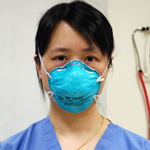
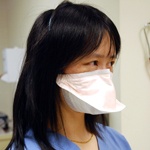
2.____ Half-facepiece air purifying respirator with particulate filter(s)
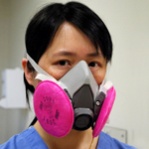
3.____ Powered air purifying respirator (PAPR) with particulate filter(s)
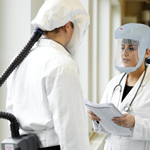
4.____ Standard surgical mask
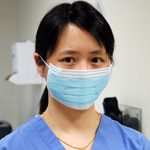
5.____ Laser mask
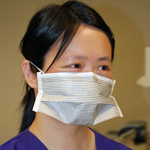
6.____ Other (specify)
____________________
7.____ I did not wear any respirators or masks
8.____ I don’t know
IF N95 RESPIRATOR, HALF-FACEPIECE, OR PAPR SELECTED:
How often did you wear a N95 respirator, half-facepiece
air purifying respirator with particulate filter(s), or powered
air purifying respirator with particulate filter(s) during
electrosurgery? 1.____ Always
2.____ Sometimes
IF N95 RESPIRATOR OR HALF-FACEPIECE SELECTED:
Have you been fit-tested for the respirator(s) you use
during electrosurgery? 1.____ Yes 0. ____ No
IF QUESTION #42 is “I did not wear any respirators or masks” OR QUESTION #42.1 is SOMETIMES:
What were the reason(s) you did not always wear a N95
respirator, a half-facepiece air purifying respirator with
particulate filter(s), or a powered air purifying respirator
with particulate filter(s) during electrosurgery?
(Select all that apply) 1.____ An engineering control (e.g., local exhaust ventilation) was being used
2.____ Exposure was minimal
3.____ Not part of our protocol
4.____ Not provided by employer
5.____ No one else who does this work uses them
6.____ Too uncomfortable or difficult to use
7.____ Not readily available in work area
8.____ Other (specify)
IF MORE THAN ONE REASON CHECKED:
Of the reasons you selected, please indicate the
most important reason you did not always wear
a respirator during electrosurgery. (Select one) 1.____ An engineering control (e.g., local exhaust ventilation) was being used
2.____ Exposure was minimal
3.____ Not part of our protocol
4.____ Not provided by employer
5.____ No one else who does this work uses them
6.____ Too uncomfortable or difficult to use
7.____ Not readily available in work area
8.____ Other (specify)
FOR EACH ITEM SELECTED in QUESTION #37.1 (items cleaned, disinfected, or sterilized):
What PPE do you typically wear when performing cleaning, disinfecting, or sterilizing of:
-
Only show/complete for items cleaned, disinfected, or sterilized from QUESTION #37.1.
Select all that apply:
Animal cages, kennels, or runs
1.____ Gloves
2.____ Goggles
3.____ Surgical mask
4.____ Face shield
5.____ Gown or apron
6.____ Other (specify): _________________
Litter boxes
1.____ Gloves
2.____ Goggles
3.____ Surgical mask
4.____ Face shield
5.____ Gown or apron
6.____ Other (specify) : _________________
Bird cages
1.____ Gloves
2.____ Goggles
3.____ Surgical mask
4.____ Face shield
5.____ Gown or apron
6.____ Other (specify) : _________________
Barn stalls
1.____ Gloves
2.____ Goggles
3.____ Surgical mask
4.____ Face shield
5.____ Gown or apron
6.____ Other (specify) : _________________
Other area(s) containing animal wastes (specify) _________________________
1.____ Gloves
2.____ Goggles
3.____ Surgical mask
4.____ Face shield
5.____ Gown or apron
6.____ Other (specify) : _________________
Medical equipment/instruments
1.____ Gloves
2.____ Goggles
3.____ Surgical mask
4.____ Face shield
5.____ Gown or apron
6.____ Other (specify) : _________________
Surfaces, such as examination tables, surgery tables, and counters
1.____ Gloves
2.____ Goggles
3.____ Surgical mask
4.____ Face shield
5.____ Gown or apron
6.____ Other (specify) : _________________
Section VI. Work Information
The next set of questions are about your workplace and work history.
Where do you currently work (facility name)? ___________________________
(online questionnaire to allow choice of participating facilities)
When did you start working at this facility? __ __ / __ __ __ __
(Month) (Year)
What is your current position in clinical
veterinary practice? (Select one.) 1.____ Veterinarian (Owner/Partner)
2.____ Veterinarian (Associate)
3.____ Veterinarian (Relief)
4.____ Veterinary technologist
5.____ Veterinary technician
6.____ Veterinary assistant
7.____ Student (veterinary school)
8.____ Student (veterinary technology school)
9.____ Student (veterinary technician school)
10.____ Office staff
11.____ Kennel help
12.____ Volunteer
13.____ Other (specify)
IF Veterinarian (Owner/Partner), (Associate), (Relief):
What year did you graduate veterinary school? __ __ __ __
(Year)
IF Veterinary technologist:
What year did you graduate veterinary technologist school? __ __ __ __
(Year)
Are you credentialed by your
state (i.e., possess an RVT, LVT, or CVT)? 1.____ Yes 0. ____ No
IF Veterinary technician:
What year did you graduate veterinary technician school? __ __ __ __
(Year)
Are you credentialed by your
state (i.e., possess an RVT, LVT, or CVT)? 1.____ Yes 0. ____ No
When did you first start working (or volunteering) in any
veterinary clinic setting? __ __ / __ __ __ __
(Month) (Year)
Have you ever worked in a veterinary clinic setting outside of
the United States? 1.____ Yes 0. ____ No
IF YES:
In what country(ies) did you work in a veterinary
clinic setting? _____________________
When did you work there? ______________________________
On average, how many hours per day do you currently work? ________ hours
On average, how many days per week do you currently work? ________ days
At your veterinary clinic, what types of animals are treated…
-
…by any veterinary personnel?
(Select all that apply.)
(If you work at multiple clinics, choose the practice type for the clinic where you work the most number of hours per week.)
…by you?
(Select all that apply.)
(If you work at multiple clinics, choose the practice type for the clinic where you work the most number of hours per week.)
1.____ Cats
1.____ Cats
2.____ Dogs
2.____ Dogs
3.____ Rabbits
3.____ Rabbits
4.____ Ferrets
4.____ Ferrets
5.____ Small rodents (e.g., rats, mice, hamsters)
5.____ Small rodents (e.g., rats, mice, hamsters)
6.____ Other pocket pets (e.g., sugar gliders, hedgehogs, chinchillas)
6.____ Other pocket pets (e.g., sugar gliders, hedgehogs, chinchillas)
7.____ Horses
7.____ Horses
8.____ Cattle (dairy or beef)
8.____ Cattle (dairy or beef)
9.____ Sheep
9.____ Sheep
10.____ Goats
10.____ Goats
11.____ Pigs
11.____ Pigs
12.____ Camelids (llamas, alpacas)
12.____ Camelids (llamas, alpacas)
13.____ Birds (non-poultry)
13.____ Birds (non-poultry)
14.____ Poultry
14.____ Poultry
15.____ Reptiles or amphibians
15.____ Reptiles or amphibians
16.____ Wildlife
16.____ Wildlife
17.____ Non-human primates
17.____ Non-human primates
18.____ Zoo animals
18.____ Zoo animals
19.____ Other (specify)
19.____ Other (specify)
Does your veterinary clinic have a fragrance-free
policy? 1.___ Yes 0. ___ No 2. ___ Don’t Know
Do you regularly interact with animals outside of your
veterinary clinic (e.g., pets at home, other non-veterinary
jobs, recreational horse riding, etc.)? 1.____ Yes 0. ____ No
IF YES:
What species do you regularly interact with outside
of your veterinary clinic? (Select all that apply.) 1.____ Cats
2.____ Dogs
3.____ Rabbits
4.____ Ferrets
5.____ Small rodents (e.g., rats, mice, hamsters)
6.____ Other pocket pets (e.g., sugar gliders, hedgehogs, chinchillas)
7.____ Horses
8.____ Cattle (dairy or beef)
9.____ Sheep
10.____ Goats
11.____ Pigs
12.____ Camelids (llamas, alpacas)
13.____ Birds (non-poultry)
14.____ Poultry
15.____ Reptiles or amphibians
16.____ Wildlife
17.____ Non-human primates
18.____ Zoo animals
19.____ Other (specify)
Section VII: Workplace Safety Climate
Please indicate how much you agree or disagree with each of the following statements about safety practices at your workplace.
|
Strongly Disagree (1) |
Somewhat Disagree (2) |
Somewhat Agree (3) |
Strongly Agree (4) |
Does Not Apply (-99) |
A. Management reacts quickly to solve the problem when told about safety hazards |
|
|
|
|
|
B. Management insists on thorough and regular safety audits and inspections |
|
|
|
|
|
C. Management provides all the equipment needed to do the job safely. |
|
|
|
|
|
D. Management invests a lot of time and money in safety training for workers. |
|
|
|
|
|
E. Management listens carefully to workers’ ideas about improving safety. |
|
|
|
|
|
F. Management gives safety personnel the power they need to do their job. |
|
|
|
|
|
Section VIII: Stress
The next two questions are about stress. Stress means a situation in which a person feels tense, restless, nervous or anxious, or is unable to sleep because his/her mind is troubled all the time.
During the past 4 weeks, including today, how would you rate
your stress outside of work on a scale from 0 (as low as it can
be) to 10 (as high as it can be)? ________ rating
(online questionnaire to display stress thermometer image)
During the past 4 weeks, including today, how would you rate
your stress at work on a scale from 0 (as low as it can be) to
10 (as high as it can be)? ________ rating
(online questionnaire to display stress thermometer image)
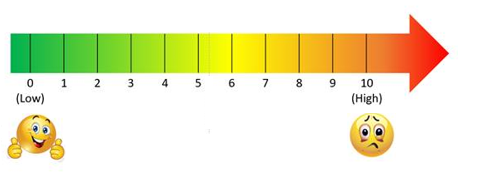
Section IX: Tobacco Use Information
The next questions are about tobacco use.
Have you ever smoked cigarettes? 1.____ Yes 0. ____ No
(NO if less than 20 packs of cigarettes in
a lifetime or less than 1 cigarette a day for 1 year)
IF YES:
How old were you when you first started
smoking regularly? ________ years
Over the entire time that you have smoked,
what is the average number of cigarettes
you smoked per day? ________ cigarettes/day
Do you still smoke cigarettes? 1.____ Yes 0. ____ No
IF NO:
How old were you when you stopped
smoking cigarettes regularly? ________ years
IF prior to any site visit to facility:
Thank you for your participation in the baseline questionnaire of this study on surgical smoke in veterinary clinical settings.
We will be at [facility name] on [dates], and for every day that you are working during that time, you will be invited to participate in the brief, post-shift questionnaire that will ask about respiratory and eye symptoms you had during your shift. Each post-shift questionnaire should take approximately 8 minutes or less. We thank you for your participation today, and look forward to seeing you when we are at [facility name] soon!
IF after final site visit to facility:
Thank you for your participation in this study on surgical smoke in veterinary clinical settings.
| File Type | application/vnd.openxmlformats-officedocument.wordprocessingml.document |
| Author | Thapa, Nirmala (CDC/NIOSH/RHD/FSB) |
| File Modified | 0000-00-00 |
| File Created | 2024-11-29 |
© 2025 OMB.report | Privacy Policy